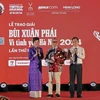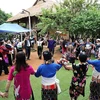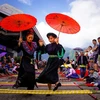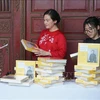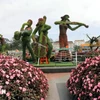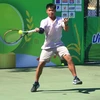Central Highlands provinces have undertaken various measures in a bid to preserve and uphold values of the cultural space of gongs – part of the world’s intangible cultural heritage.
The cultural space of gongs was recognised as an Oral Masterpiece and Intangible Cultural Heritage of Humanity by UNESCO in 2005.
However, the Central Highlands—encompassing Dak Lak, Gia Lai, Kon Tum, Dak Nong, and Lam Dong—is facing a disintegration of this heritage as some ethnic minority households have recently sold their gongs and dismissed their traditional festivals due to impacts of the market economy and western lifestyles.
To cope with the decay, the provinces have designed respective blueprints for the preservation of the cultural space and purchased sets of gongs which were then distributed to local cultural and community centres to use.
Training courses have been offered to instruct local children to play gongs, bringing the number of gong teams in the region to nearly 1,400, 991 of which group young players.
Dak Lak province alone has spent more than 6 billion VND (over 279,000 USD) on buying 150 sets of gongs for 150 cultural centres in ethnic communities.
The province has invited Ede and M’nong ethnic artisans to teach children how to play gongs and some villages have proactively coordinated with primary schools to invite experienced players to give instruction sessions.
As a result, Dak Lak is currently home to 700 gong teams, including 200 teams of young people.
A number of traditional festivals and gong songs have been revitalised while cultural festivals at the district and provincial levels have also been held every two or five years to help ethnics popularise their culture.
Gongs, considered the most sacred and valuable asset in every ethnic family in the Central Highlands, have historically been widely played at ethnic minority groups’ traditional rituals and festivals.
Ethnic families in the region are keeping more than 9,880 sets of gongs with over 5,650 sets in Gia Lai and another 2,307 in Dak Lak. Most of the gongs belong to the Jarai, Bahnar, Ede and M’nong groups.-VNA
The cultural space of gongs was recognised as an Oral Masterpiece and Intangible Cultural Heritage of Humanity by UNESCO in 2005.
However, the Central Highlands—encompassing Dak Lak, Gia Lai, Kon Tum, Dak Nong, and Lam Dong—is facing a disintegration of this heritage as some ethnic minority households have recently sold their gongs and dismissed their traditional festivals due to impacts of the market economy and western lifestyles.
To cope with the decay, the provinces have designed respective blueprints for the preservation of the cultural space and purchased sets of gongs which were then distributed to local cultural and community centres to use.
Training courses have been offered to instruct local children to play gongs, bringing the number of gong teams in the region to nearly 1,400, 991 of which group young players.
Dak Lak province alone has spent more than 6 billion VND (over 279,000 USD) on buying 150 sets of gongs for 150 cultural centres in ethnic communities.
The province has invited Ede and M’nong ethnic artisans to teach children how to play gongs and some villages have proactively coordinated with primary schools to invite experienced players to give instruction sessions.
As a result, Dak Lak is currently home to 700 gong teams, including 200 teams of young people.
A number of traditional festivals and gong songs have been revitalised while cultural festivals at the district and provincial levels have also been held every two or five years to help ethnics popularise their culture.
Gongs, considered the most sacred and valuable asset in every ethnic family in the Central Highlands, have historically been widely played at ethnic minority groups’ traditional rituals and festivals.
Ethnic families in the region are keeping more than 9,880 sets of gongs with over 5,650 sets in Gia Lai and another 2,307 in Dak Lak. Most of the gongs belong to the Jarai, Bahnar, Ede and M’nong groups.-VNA




